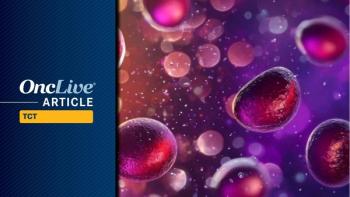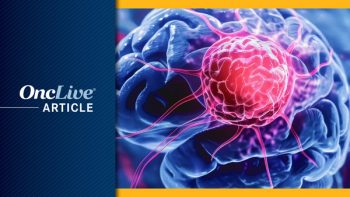
CAR T-Cell Therapy in Other Disease Settings and Beyond
Transcript:
David Maloney, MD, PhD: We’ve been talking really about lymphoma and leukemia right now, but there are some other diseases that are pretty exciting. What do we know of multiple myeloma?
Matthew Lunning, DO: What I understand about the new BCMA [B-cell maturation antigen] target in myeloma is that the myeloma doctors are incredibly excited, and as a CAR T-cell physician, I’m incredibly excited to get the new targets and get those patients into the clinical trials.
David Maloney, MD, PhD: Yes. I think we’ve seen data now from 3 clinical trials, plus the Chinese preclinical trials as well, which show that there can be really deep remissions. These patients have just been incredibly pretreated. I think some of the averages have been 15 prior regimens, and in that setting the durability has not been maybe as much as we would have wanted. But I think we need to take that with a grain of salt because these are incredibly refractory/resistant patients and seeing any kind of responses are miraculous for some of these patients. And so I think we have a lot to learn.
Leo I. Gordon, MD, FACP: I think one of the other questions in myeloma is that because autotransplant [autologous transplantation] is so engrained as part of the regular therapy for that disease, do we do this in place of autotransplant, before autotransplant, or after autotransplant? I think those are going to be some of the questions we have to address.
Matthew Lunning, DO: Yes, the questions are going to be asked. The high-risk subgroups of myeloma are like the high-risk groups in lymphoma. Those people relapse very quickly after an autologous transplant. Those people, you know, the depth of response after autotransplant are going to be questioned.
David Maloney, MD, PhD: But I think we’re also seeing that the degree of myeloma burden is very predictive also of toxicity. So patients with massive tumors and solid tumors, it’s a trickier thing to get rid of.
Leo I. Gordon, MD, FACP: Right.
David Maloney, MD, PhD: All right. We also saw encouraging data with CLL [chronic lymphocytic leukemia], the Penn [University of Pennsylvania] group reported data, and our group as well reported data on concurrent ibrutinib plus CAR T cells. I think we’re encouraged in both of those trials. It looks like ibrutinib concurrent use can do several things. One, it appears to make better functional T cells. Those T cells can expand better in patients with concurrent ibrutinib and the CAR T-cell treatment. And it also seems to cut down on the magnitude of CRS [cytokine release syndrome]. So the CRS incidence was about the same, but regarding the number of grade 3s or above, we didn’t have any cases in our series of about 19 patients.
Leo I. Gordon, MD, FACP: Also the data show that they inhibit T-regs [regulatory T cells].
Michael Pulsipher, MD: Did that affect durability at all or was that measured?
David Maloney, MD, PhD: The durability was hard to say, but it seemed to increase the depth of remission so that for a given CAR T-cell dose, we got higher CAR T-cell expansion, especially in the CD4 cells, which was interesting. And then that led to greater incidence of the deep sequence MRD [minimal residual disease]-negative complete remissions. And so I think the interesting thing would be, could this apply to lymphoma where we don’t typically use ibrutinib, right? But maybe you could suddenly be thinking about an agent like ibrutinib or lenalidomide to alter those T-cell functions.
Leo I. Gordon, MD, FACP: Absolutely. I think the idea to modify T-regs and other T-cell populations, that it might interfere with the effect of our CARs, is an important one.
David Maloney, MD, PhD: All right. So what about solid cancers?
Leo I. Gordon, MD, FACP: In solid cancers, there are some data. There are some very preliminary studies. It faces several problems. One is the targets. There are targets. Mesothelin is a target. It’s present in some lung cancers and mesothelioma. There are targets that are present in brain tumors in kids. But there are 2 other issues that occur in solid tumors that will have to be solved. The fibrosis associated with most solid tumors might interfere with the ability of the CARs to get where they’re supposed to go. We don’t see that much in lymphomas or in ALL [acute lymphoblastic leukemia], but that’s a potential concern.
And then the other might be that solid tumor patients haven’t had some of the immunosuppressive therapy that patients with lymphoma or leukemia have had. And so you may be dealing with a more intact immune system and maybe more difficulty getting the CARs to proliferate.
Michael Pulsipher, MD: It’s really a different problem with solid tumors. The local environment with solid tumors is very different. The regulatory environment is extreme for T cells. And so we need to figure out both ways of delivering T cells because in some solid tumor situations the CARs just can’t get to the solid tumor. In others they can get there, but then they’re downregulated. So we have to get them there and make sure that they’re turned off.
Leo I. Gordon, MD, FACP: Right. And there are critical challenging problems but an interesting biology. It opens up a whole bunch of questions you just alluded to about the biology of those and how to manipulate that biology in a favorable way.
David Maloney, MD, PhD: Well, this has been extremely informative. Before we go and end this discussion, I’d like to get final thoughts from each of our panelists. Dr Ghosh?
Nilanjan Ghosh, MD, PhD: So my take-home messages are that at least in diffuse large B-cell lymphoma in the relapsed and refractory setting, we’ve seen now that there are durable responses, in at least the range of around 40% of patients have durable complete remissions. Yes, there is CRS and neurotoxicity, which can be serious. But the majority of that is reversible. And it doesn’t appear that with the increasing use of early intervention that you are affecting efficacy. Or rather it is helping us in picking up these toxicities early and then managing them in the real-world setting as well. So those things appear to be very exciting.
David Maloney, MD, PhD: Dr Gordon?
Leo I. Gordon, MD, FACP: I think this is a wonderful example of translational biology that goes back probably decades now. And the application of some of these early basic science observations, pure laboratory observations, ends at the clinical setting that opens up a whole new era of cellular therapy and a treatment for cancer that certainly applies in leukemia and lymphoma, but even will apply in multiple cancers. So I think it’s an amazing era to be in and to see the development of basic science observations to the bedside.
David Maloney, MD, PhD: Dr Lunning?
Matthew Lunning, DO: The fact is we are seeing some signs of durability, but we can’t forget about those patients who are early on and are progressing, such that we need to be continuing the research endeavor to move the curve up. While we’ve got a tail on the curve, the tail can become higher, and we should be striving on the research aspect of the correlative of studies to make that happen.
David Maloney, MD, PhD: And Dr Pulsipher?
Michael Pulsipher, MD: It’s been such an exciting couple of years that we’ve had CAR T cells. I think that in the future—and we’re beginning to see it—we’re going to see multitargeted CAR T cells. We’re going to see CAR T cells that are hopefully less toxic. We’re going to see CAR T-cell duration that is going to be necessary for whatever disease we’re targeting over the next few years. And eventually in ALL we’ll want to turn CAR T cells off so we can give patients their T cells back. But I think we need a few more years to go by, and we need to get smarter.
David Maloney, MD, PhD: I would just add that the companies have challenges here too. They need to be able to manufacture a quality product on time. We have to be able to get them to our patients. It’s often challenging managing patients while you’re waiting for products. And so the future is really, really bright. Well, thank you all for your contributions to this discussion. On behalf of our panel, we thank you for joining us, and we hope that you found this Peer Exchange® discussion to be useful and informative.
Transcript Edited for Clarity




































